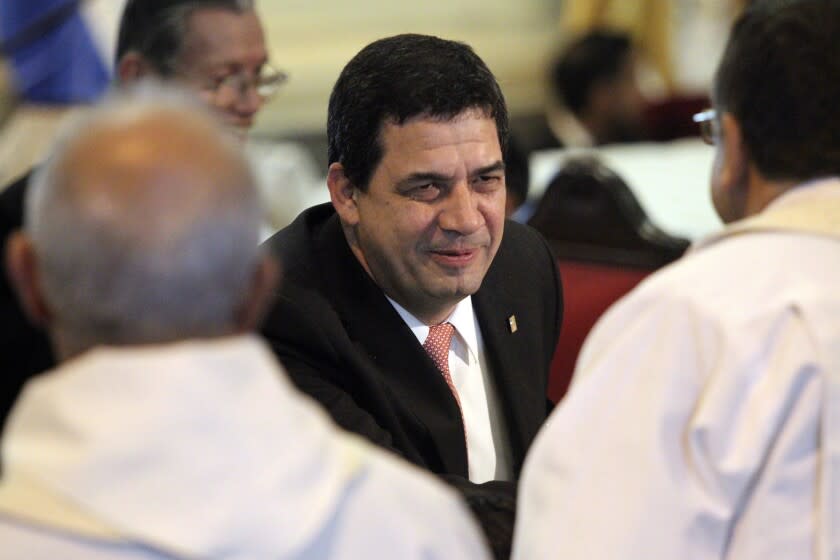Paraguay vice president to quit after U.S. alleges corruption

- Oops!Something went wrong.Please try again later.
Hugo Velázquez Moreno said Friday he will resign next week as vice president of Paraguay after being included on a U.S. corruption list for alleged involvement in offering bribes to a public official.
His inclusion on the corruption list, announced Friday morning by Marc Ostfield, the U.S. ambassador to Paraguay, rocked Paraguay’s political world not only due to Velázquez's role in President Mario Abdo Benítez’s administration but because he is seen as a leading contender to be a candidate for the Colorado Party in next year’s presidential election.
Minutes after Ostfield spoke at a news conference at the U.S. Embassy in Asunción, the capital, Velázquez expressed his innocence but said he would drop his presidential candidacy and would present his resignation to Congress next week so he could defend himself against the allegations.
“It really hit me like a bucket of cold water,” Velázquez said during an interview with a local radio station. “I don't know what he's referring to, because he didn't give too many details.”
Ostfield said Juan Carlos Duarte, a former prosecutor who is a personal and business associate of Moreno, was also named on the corruption list. Ostfield said Secretary of State Antony J. Blinken “received credible information” that showed how, “at the request of Vice President Velázquez, Duarte, his close personal and professional partner, offered a bribe of more than $1 million to a public official.”
This was “consistent with an apparent pattern of corrupt activity,” and, in this case, was carried out to “obstruct an investigation that threatened the vice president and his financial interests,” Ostfield said.
As a result of the designations, Velázquez, Duarte and their immediate family members will no longer be allowed to enter the United States.
Velázquez said he is “completely and totally” in the dark about the allegations detailed by Ostfield. The vice president said he would resign because he wants to “go out like a common citizen to defend what I think is an injustice."
Abdo said the U.S. allegations “surprised us all” but praised Velázquez for his quick decision to drop out of the presidential race and announce his resignation.
“I congratulate him for his mature attitude in prioritizing the interests and the construction of credibility of our nation in announcing to the Paraguayan people that he will resign as a candidate and as vice president,” the president said.
In addition to his close relationship with Velázquez, Duarte is legal counsel for the entity that runs the Yacyretá Dam, which is jointly owned by Paraguay and Argentina.
“Duarte’s act of corruption abused and exploited his powerful and privileged public position within the Yacyretá Bi-National Entity, risking public confidence in one of Paraguay’s most vital economic assets,” the State Department said.
Duarte has been removed from his post at Yacyretá, Abdo said.
The designation comes weeks after a former president of Paraguay, Horacio Manuel Cartes, was included on a U.S. list for his “involvement in significant corruption.” Cartes served as president between August 2013 and August 2018.
Ostfield emphasized that the designation “has nothing to do with politics,” and Washington “will continue working closely with President Mario Abdo Benítez and his government in a variety of issues, including the fight against corruption, impunity and against money laundering and terrorism financing.”
This story originally appeared in Los Angeles Times.

